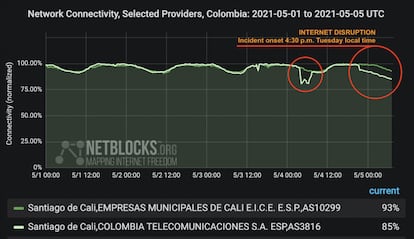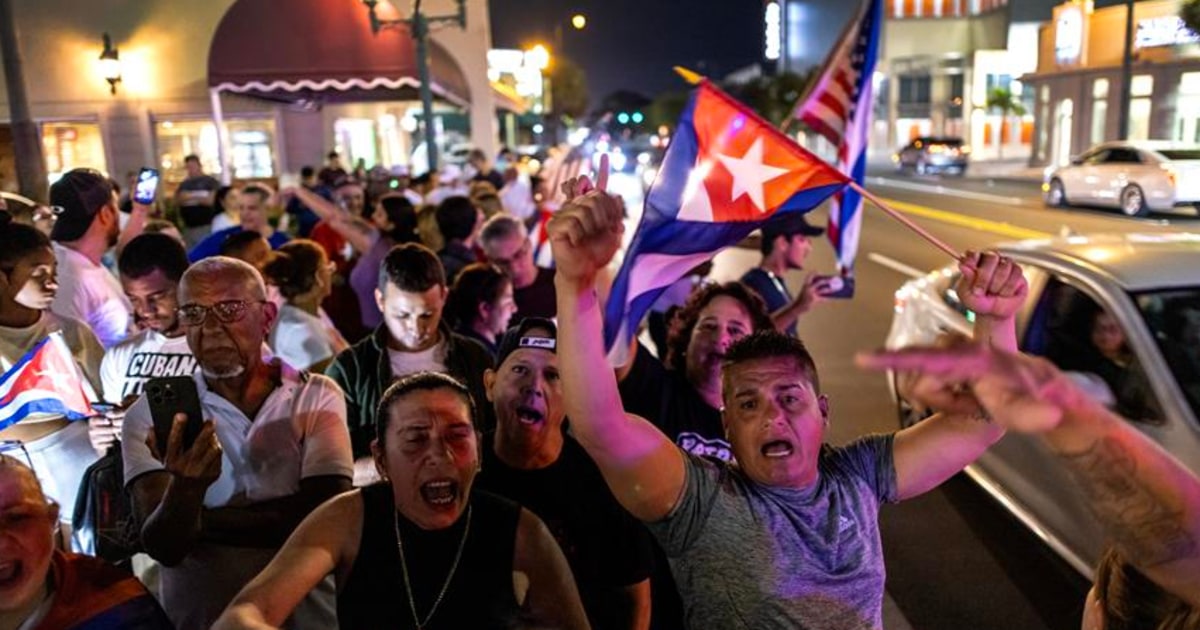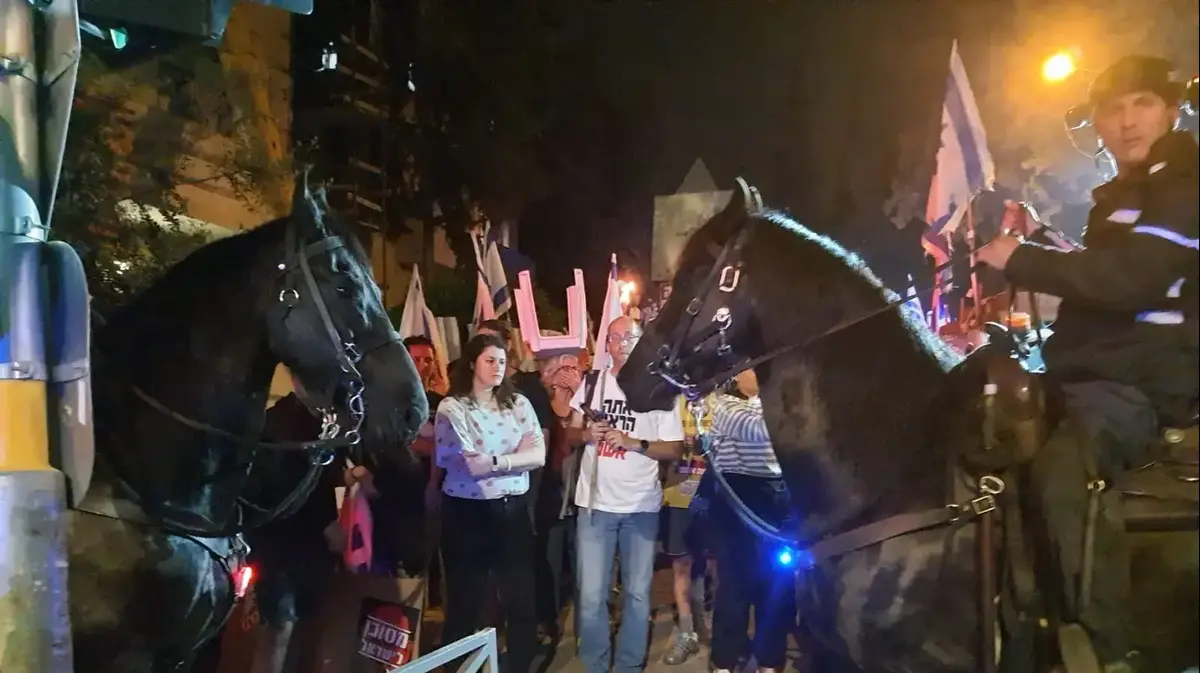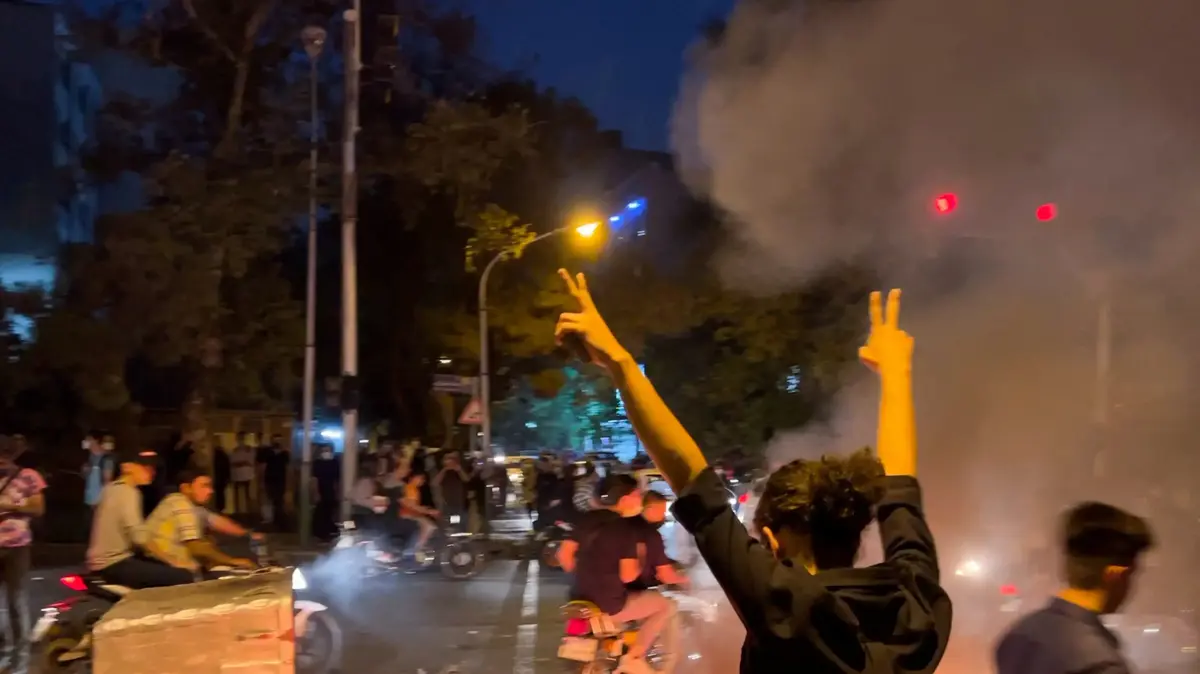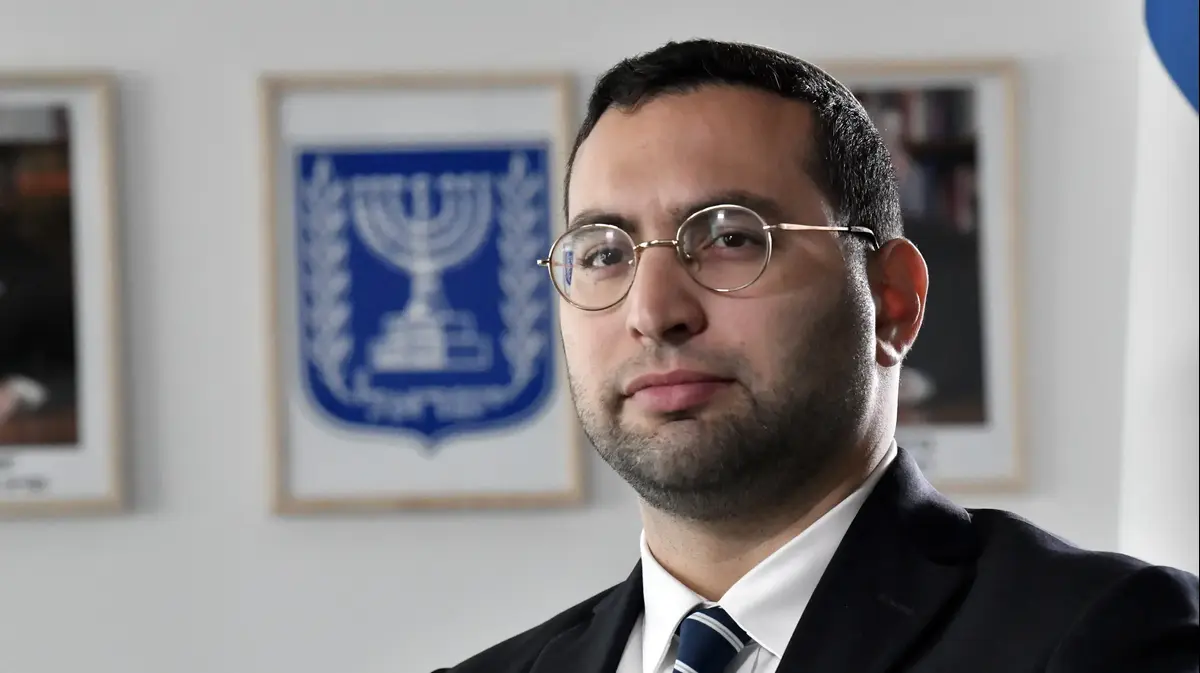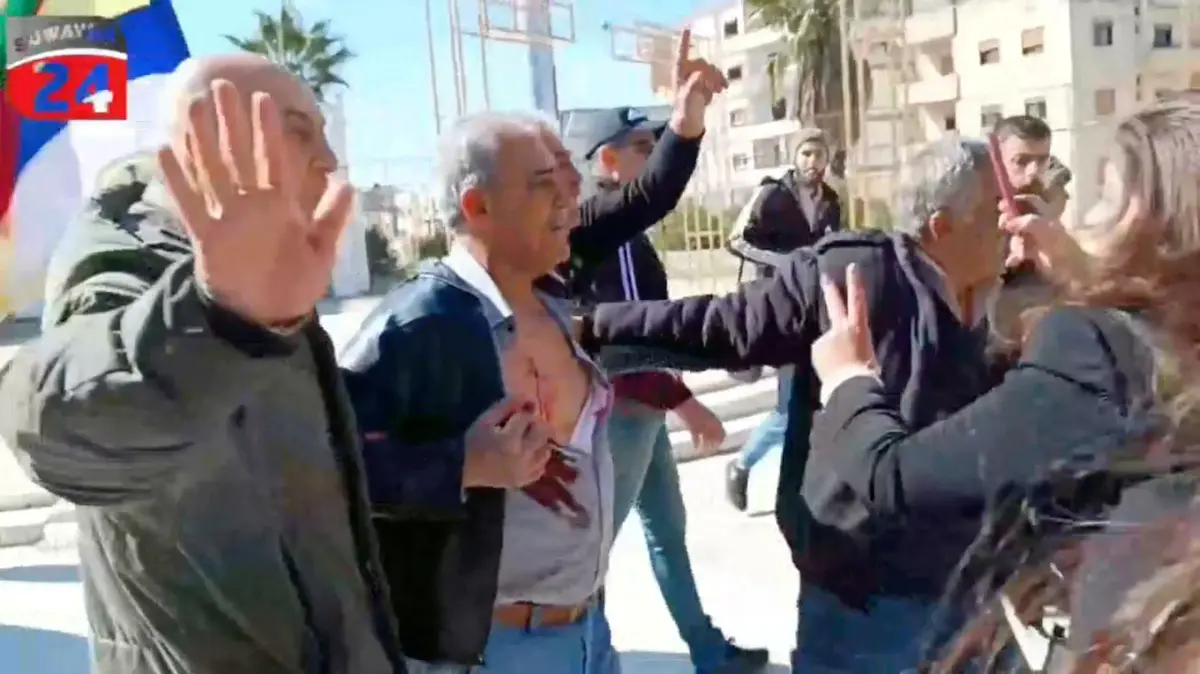A protest on the night of May 5, in Cali (Colombia) LUIS ROBAYO / AFP
The Siloé neighborhood, in the city of Cali, has been one of the places where the most violence has been reported during the protests in Colombia. A young woman from the place told EL PAÍS that on the night of Tuesday, May 4, the internet signal in the sector had failed and it had not been possible to transmit the clashes between the public force and the protesters through social networks, as had been done in the previous nights. "We heard gunshots, explosions and screams in the street, but the Facebook and Instagram live transmissions did not load, they stuttered and fell off the network," said the woman, who asked not to be identified to protect her safety. "The last we saw was at 9:00 pm when a girl who was in the middle of the protests and tried to transmit what was happening through her networks said 'the police are coming dressed in civilian clothes.'After that the video ended and we didn't hear anything else. We started looking for other transmissions, but we no longer had an internet signal. Not even with the cell phone data, "he added.
The young woman, who has witnessed how the police have fired firearms at friends and acquaintances in the last three days, said that from ten o'clock at night she and her family were "completely incommunicado until the next day." Your complaint is not the only one. Leonardo Quintero, an artist who was in the neighborhood that night, stated that after 10 p.m. it was impossible to watch or transmit videos. “It seemed as if the internet was down. We tried to put a video and it appeared loading, but it never loaded. We couldn't see what was happening in the neighborhood. We know that there were very strong disturbances, tear gas and helicopters flying overhead, because we heard them, but there was nothing in the networks, ”he explains.
In addition to these testimonials, one of the first Twitter trends on Tuesday night was #Calicensurada.
Hundreds of people who could not communicate with their relatives within the Siloé neighborhood expressed their concern with messages such as: “In Cali, no one in my family has a signal.
Help.
I need to know how they are ”.
More information
In the trench of Puerto Resistencia, the insurgent bastion of Cali
What is happening in Colombia?
The keys to a conflict that spreads across the country
On the morning of this Wednesday, the British organization Netblocks, which monitors internet access worldwide, published an alert denouncing an "internet interruption amid the protests in Colombia." According to the entity, which in recent months has reported Facebook failures in the riots in Bangladesh or the internet crash on election day in Congo, the difficulties in connecting to the internet in Cali began at 4:30 p.m. on Tuesday and lasted until the early hours of Wednesday. "Our metrics corroborate reports from users who had trouble connecting amid the protests." In the report, Netblocks states that "landline and cell phone services have been affected for the second time in recent days." According to the platform, these interruptions,that were presented mainly in the Internet operators Telefónica and Emcali, "may significantly limit the free flow of information from the place of the protests."
Netblocks
Anonymous, a group of
hackers
that in recent days has taken down the web pages of various institutions of the Government of Iván Duque, such as the presidency and the Army, also assured that there was a "cut off of the fixed and cellular internet signal" , and that Siloé was the most affected area.
"At the moment there is 42% coverage in the city of Cali," Anonymous published on its social networks at dawn on Wednesday.
After hearing the report from the London-based NGO, the companies Telefónica and Emcali assured that there had been no intentional blocking of the signal. Emcali said in a statement that fixed internet access "has worked in optimal conditions." Telefónica, for its part, explained that the failure could be due to a cut in the network of fixed telephony and internet services that affected 7,000 clients in the Aguablanca district of Cali. The company stated that the public order situation "has not allowed the technical team to complete the repair work."
Germán Centeno, director of communications for Telefónica in Colombia, assured that they had an incident of theft of infrastructure at four in the afternoon. "Several people entered the sewers where the copper cables are and took them away." The company believes that the 4:30 p.m. drop on Tuesday reported by Netblocks could be related to that theft. Centeno was emphatic in stating that the company "has never restricted or will restrict internet freedom in Colombia."
Sergio Martínez, director of the Colombian Communications Regulatory Commission (CRC), agrees with Telefónica: "We believe that the damages were mainly caused by these damages." He adds that “another explanation may be a network collapse due to congestion and excess traffic. Something similar to what happens in a stadium or in a concert when the signal goes out because there are many people trying to send a photo or a video at the same time ”.
The theft of fiber cables in Aguablanca does not fully explain the complaints of signal failure at night in Siloé, since they are very remote neighborhoods and have independent networks. Martínez affirms that at the moment the CRC cannot verify whether or not there was a fall in the Siloé sector and of what magnitude it was due to the fact that minute-by-minute information takes two or three days to be processed. "We will see any variation in internet traffic this morning on Friday and Saturday." The director of the CRC said that in Colombia the state cannot ask an operator to censor social networks or limit the internet. “That would be a criminal offense. They could lose their license and have to pay fines. "
The Ministry of Telecommunications spoke in the same direction.
“Connectivity is a right of all Colombians and one of the essential ingredients of economic reactivation.
At the ICT Ministry we have to ensure that all citizens have access to telecommunications.
We have fulfilled this function and we will continue to fulfill it ”.
The ministry confirmed the failure of the service in Aguablanca, but did not comment on Siloé.
Signal inhibitors
The Cali episode is part of a larger debate. Carolina Botero, director of Karisma, a Colombian foundation that is dedicated to ensuring the protection of citizens' digital rights, argues that it is very important “to transfer the guarantees of physical protest to the digital world, especially now that many people do not they can leave their homes due to the pandemic and the networks are the only way they have to find out what is happening outside ”. He points out that the internet crashes reported by Netblocks may be due to damage to infrastructure, as companies say, or to other factors that are more complex and difficult to verify, but which have been used in other countries amid protests. "We maintain our suspicions as to whether the public force is using internet signal inhibitors in areas like Siloé," says Botero.These inhibitors are normally used in prisons and work as an antenna that blocks or limits the cell phone signal in a certain geographical area.
Hundreds of complaints from citizens have been added to the failures in the internet service in the last few hours who claim that Instagram and Facebook are blocking their stories of the protests, especially those that use numerals related to police violence such as #soscolombia, #renunciemolano or #vivaelparonacional, which have been used by artists and public figures such as Susan Sarandon and Residente.
As a result of these complaints, an official spokesperson for the company in Colombia explained that the algorithms detect publications with violent images and automatically block them so as not to violate community regulations. However, he affirmed that they are working with a special group to restore the images of the protests in Colombia with a warning message: “In the framework of the demonstrations in Colombia, we are working to enable publications that are of public interest, warning the users that may be sensitive content ”.
The only certainty, for now, is that during the night of May 4 and early 5, the inhabitants of Siloé in Cali could neither see nor transmit what was happening in their neighborhood due to internet signal failures.
As the young woman who asked not to be identified claims: “The Internet is the only medium that really allows us to see what is happening outside and show the world how they are killing us.
We are against limiting this communication service ”.
Subscribe here
to the
EL PAÍS América
newsletter
and receive all the information keys on the region's current affairs

